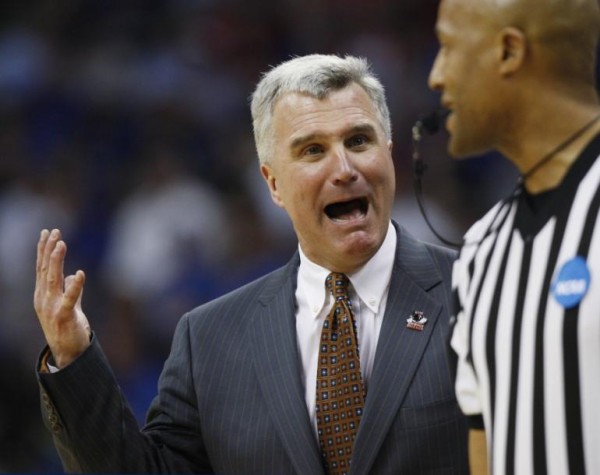As we put the final touches on our overview of the college basketball scene and transition to our offseason period at The Student Section, it’s worth looking at various programs that all have reasons to be concerned… different reasons, mind you, but reasons that point to the same high level of anxiety.
Various coaching situations can all be distressing, but don’t think that a certain kind of equivalency can be assumed based on an assessment of raw coaching acumen. Coaching situations — the extent to which a coach fits a program — are in many ways measurements of the job, not just the coach and his level of acumen. We engaged in a similar discussion on Monday when ranking the best high-profile coaching hires from the past month.
One more note before going forward: No, this is not a hot-seat piece. If some of the coaches mentioned in the next few paragraphs have not been fired by now, they’re probably not going to be fired next season, barring a scandal or some other tipping-point event we can’t reasonably predict at the moment.
*
Let’s start our discussion with the worst high-major coaching situation in the land:
Georgia Tech retained Brian Gregory simply because it couldn’t afford the current buyout, a product of the fact that it is also paying former coach Paul Hewitt to not coach. After next year, the Yellow Jackets will be in a much better position to afford the buyout. Nevertheless, it’s hard to occupy a more feeble and impotent situation than the one faced by Georgia Tech. The next season feels like a waste already; Gregory will have to do his very best to successfully defy expectations, because the expectations are wholly negative in Atlanta.
Another program where the coming season feels like a pointless throwaway exercise is Kansas State. Combining graduations, disciplinary actions resulting in dismissals, and transfers, the Wildcats will have a threadbare roster next November. The steady fade Bruce Weber set in motion after a bright start at Illinois has repeated itself at Kansas State, only with more speed.
Another team that has quickly (and recently) slid into a position similar to Kansas State’s uneasy spot is Washington. The transfers of Nigel Williams-Goss, Dustin Johnson, and Gilles Dierickx — combined with the dismissal of Robert Upshaw during the 2014-2015 season — have eroded both the quality and depth of the Hsukies’ roster. The last thing Lorenzo Romar needed — as he fights for his job in Seattle — is for his program to rely on a thin and relatively inexperienced group of players next season.
*
Other coaching situations that need a boost sooner rather than later are the ones faced by Travis Ford at Oklahoma State; Dave Rice at UNLV; and Josh Pastner at Memphis. These coaches all made the NCAA tournament in 2013 and have actually gone Dancing multiple times in their careers. They’re not bums. Yet, at each of their programs, basketball matters and carries historical weight.
Oklahoma State is (Hank) Iba University. UNLV is Jerry Tarkanian’s school (in a basketball sense, of course). Memphis has reached Final Fours in three different decades, once each under two of the great coaches in the sport’s history: Gene Bartow (1973) and John Calipari (2008). Dana Kirk brought the program to the Final Four in 1985, and Larry Finch — who played on the 1973 Final Four squad — took the Tigers to the 1992 Elite Eight before losing to Cincinnati.
The question at these schools is not whether another NCAA tournament can be reached. These programs are wondering if they’ll get to the second weekend of the NCAAs anytime soon. No, their coaches aren’t on hot seats… but if a couple of years pass by without a noticeable result, these three schools might begin to look elsewhere for new basketball leadership.
*
In the next batch of schools, Penn State and USC don’t have rich basketball traditions, but the sense of stagnation surrounding Pat Chambers and Andy Enfield is impossible to ignore. If these two coaches can’t begin to turn things around in the coming season, it’s going to be hard for either school’s athletic department to refrain from making a move.
Blessed with more of a basketball reputation than Penn State or USC, Stanford and Illinois find themselves in very similar situations. They both missed the 2015 NCAA Tournament despite owning copious quantities of talent. Johnny Dawkins and John Groce could certainly sweat to some extent if the 2015-2016 seasons turn out to be busts in Palo Alto and Champaign. Dawkins is probably in a safer spot.
*
Georgia Tech’s money woes. Kansas State’s and Washington’s transfer problems.
Expectations at Oklahoma State, UNLV and Memphis.
Non-basketball schools struggling in Happy Valley and Los Angeles.
Talent-laden programs falling short on The Farm and in the Land of Lincoln.
Broken, paralyzed, trapped — negative college basketball coaching situations acquire all shapes and sizes. They carry distinctly different dimensions. Yet, they all offer considerable cause for alarm as a very crucial offseason gets off the ground. We’ll see in November how these programs respond to the adversities engulfing them.
